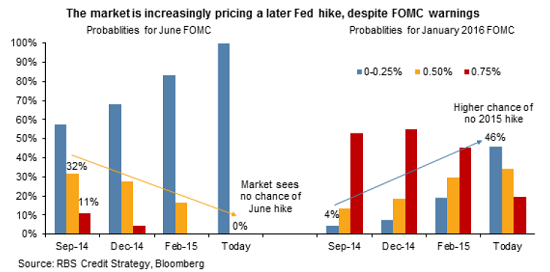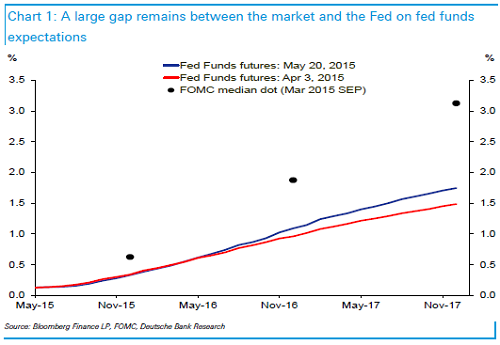Is the Fed backing away from a 2015 rate hike?
Federal Reserve officials remain reluctant to pull the trigger on the first interest rate hikes since 2006.
That's the upshot of the account the central bank released today of its April meeting. Although policymakers believe the recent slowdown in economic growth owes to transitory factors, many also believe the weakness justifies delaying a rate hike until after the June meeting of the Financial Open Market Committee, the Fed's rate-setting panel.
Also leaning against hiking rates sooner rather than later, a "number" of participants worry that economic drags from the strong dollar and lower energy prices could be larger and longer lasing, according to the minutes of the FOMC's April 28-29 meeting. The consensus is now pooling around September as the most likely date for a lift-off in rates.
But even a September hike may not happen, according to some market participants.
Before the release of the Fed minutes Alberto Gallo, a credit analyst at the Royal Bank of Scotland, noted that the futures market has fully priced out the possibility of a June hike, and is increasingly pricing out any rate hike all this year. Currently, it is even money that the Fed will wait until early 2016 to boost interest rates, some investors seem to think.
This goes too far, in his view, given that the U.S. job market is increasingly healthy and evidence that inflation should rise closer to the Fed's 2 percent target toward the end of the year.
Gallo isn't alone in wondering if the Fed is holding off in raising rates out of fear of tightening into a mid-cycle slowdown and/or rattling financial markets (with the rise of high-frequency traders and low bond market liquidity both mentioned as concerns by officials).
The Federal Advisory Council -- a group of 12 banking industry representatives chosen by the 12 Federal Reserve Banks -- recommended in May that interest rates be hiked in June -- with the caveat that this shouldn't necessarily result in further rate hikes immediately after.
The FAC specifically said the Fed shouldn't wait to fulfill both its employment and inflation mandates before beginning to normalize short-term interest rates from the near zero percent level they've been at since late 2008. The risks of waiting too long includes the straying of asset prices further away from fundamental values -- something Fed chairman Janet Yellen recently warned of -- as well as evidence that low rates lack effectiveness in stimulating capital investments.
It's worth noting that the futures market remains much more dovish concerning the pace and timing of rate hikes than the Fed is. An update of the individual economic projections of Fed policymakers next month could help close the gap -- something stocks cheered when it happened back in March.
All of this merely raises the stakes for the Fed's policy announcement on June 17, continuing the cycle of dependence on every word and inflection out of the Marriner Eccles building in Washington.


